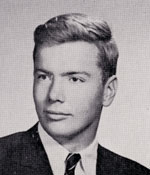In Memoriam
Pete Woodward

Pete Woodward
1964 graduation
Obituary
New York Times
September 20, 1969
Peter Woodward, a graduate
student of political science at Princeton University and the son of Dr. C.
Vann Woodward, Sterling Professor of History at Yale University, died today
of cancer in the Yale-New Haven Hospital. He was 26 years old and lived in
Princeton, NJ.
Mr. Woodward was graduated from Yale in 1964.
Surviving, besides his parents, are his widow, the former Susan Lampland,
also a graduate student in politics at Princeton.
Remembrance
by Susan Lampland Woodward
Was there ever anyone with more zest for life than Peter Vincent Woodward? I never met one, before or after his death from melanoma on September 20, 1969. His very special buddies from camping days in Canada, spending two summer months together every year for eight during adolescence in wilderness canoeing in Ontario and Quebec, would attest. So would those he met in wrestling matches at Yale, and, of course, his roommates at Morse College (where the length of the beds fit his length, happily, and unlike others, he never found the lack of right angles to be a problem).
This joi de vivre, although totally infectious for those around him (and certainly for me), was not cavalier or Gatsbyesque, however. It was always connected in some way to serious, "adult" questions and concerns. His wilderness experience persuaded him that Canadian federalism, and especially the role that Francophones and the province of Quebec could find in Canada, was a very serious object of scholarly study. It became the subject of his doctoral dissertation research in political science at Princeton and in Quebec. The work that he did has not yet been done by others, despite the very lively community Peter engaged at McGill University in Montreal, where he had an office, and at Queens University in Kingston, Ontario, where the best on the subject at the time were based and who embraced him. The loss to scholarship is very real. Similarly, the highlight of his senior year at Yale was the tutorial and senior thesis he did with the visiting Italian (really "European") philosopher, Alexandre Passerin d'Entreves — it sent him off to Oxford to do a degree in PP&E (politics, philosophy, and economics) at Queens College for two years, but equally to visit Passerin in his family's castle in D'Entreves!
Perhaps it was this total wonder and enthusiasm for life and its connection to philosophical and political questions of vital importance for peoples' lived condition that enabled him to circumnavigate the personal challenges of all those who are sons of famous fathers (in his case, the historian, C. Vann Woodward) and to find his own place in a separate but contiguous space — in political science, straddling political philosophy, comparative politics, and American politics in a way that would astonish most graduate students in political science these days; in his research and writing on fiscal federalism for the Governor of New Jersey in the summer of 1967, the report which would become the key document of the Governors' conference that year; and yet also, as with his parents because of their Southern origins, with an inner, almost instinctual passion for social justice and the fight against racial and other discrimination that was so important to all of us at the time. I assumed that we would seek our first faculty positions in political science in the South for this reason.
Despite the doctors' prognosis, Peter continued with his doctoral plans after the massive operation on his lymph glands and upper musculature in September 1968, and we moved to Montreal on the hope that all would be well. For those who now criticize Canadian public medicine, I want to declare that he received simply wonderful care and attention on a regular basis. The cancer's reoccurrence in June, 1969, interrupted the very important and innovative research he was doing, and we were able to take advantage of the fact that one of the two best places for cancer treatment in the country at the time, according to specialists in New York, was Yale Medical Center, and thus chose to move in with his parents in New Haven, where they could have those special months with him as well and where we could watch, perhaps with some irony, the "landing on the moon" of US astronauts. The contest over that summer between the cancer and his enormously healthy physique, on the one hand, and his lust for life, on the other, was almost epic. He lost the physical battle, but we who knew him retain the gift of his immense enthusiasm for life.
[Webmaster's note: As of this posting in 2009, Susan Lampland Woodward, Peter's widow, is at The Graduate School, City University of New York, where she is a Political Science professor and Director of the Program on States and Security.]

